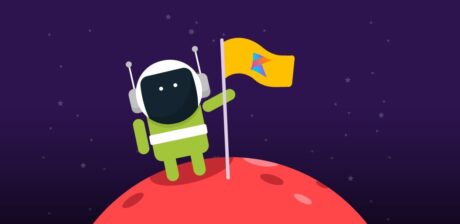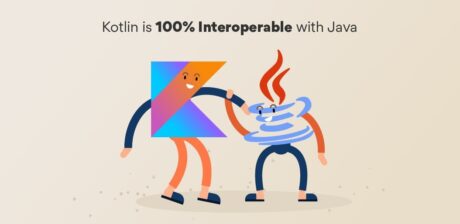Do you want to learn more about Android app development in the future? Check out this article about Kotlin and how it will shape Android app development in the future.
Being an Android developer at the moment is a thrilling experience. The formal backing that Google has offered to the programming language Kotlin is a significant cause for this enthusiasm. Kotlin provides the functionalities that developers have requested. It’s a Java Virtual Machine-compatible, statically typed programming language.

It is a free, open-source computer programming language that blends object-oriented and functional programming concepts. Kotlin was created in 2011 by programmers at JetBrains, a Russian software development firm, and was later expanded by a number of open-source developers.
Because of two factors, Kotlin is still relevant today. It was created as a response to the challenges that Android developers have encountered over time. As a result, it addresses the majority of the major concerns that have arisen in Java, offering interoperability, safety, clarity, and tooling assistance to developers.
However, it is being hailed as a game-changer in the Android app development ecosystem because Google, the parent company of Android, announced that Kotlin is now an official Android language and that Google will provide first-class support for Kotlin on the Android platform at its annual developer conference, ‘Google I/O 2017.’
With Google embracing Kotlin, prominent developers are following suit, and since many Java apps are now being rewritten in Kotlin, it is seen as the future of Android app development. Similarly to how Swift secured the demise of Objective-C in the past, Kotlin is poised to oust Java from the Android app development market today.
This is why this language is causing such a stir in the Android app development community.
The development of Kotlin began in Russia in 2011. Its parent firm, JetBrains, was seeking for a Java alternative to employ in their products owing to the limits that Java put on developers. With no change in sight, they decided to hunt for a new Java compatible language, despite the fact that they already had a sizable Java code base.
They identified Scala to be the best acceptable Java Virtual Machine (JVM) language for their static compilation requirement out of the numerous available JVM languages.
However, once they started using Scala, they discovered that it was both sluggish to compile and lacked a solid Integrated Development Environment (IDE) support. As a result, JetBrains decided to create their own programming language, Kotlin.
Excitement around Kotlin
The fact that Google has adopted Kotlin as the go-to language for Android app development has fuelled interest in the language. Its modernity – in terms of power, adaptability, and democratic attitude – was the primary basis for its acceptance. Kotlin is also compatible with other Android programming languages. Kotlin is a language that borrows ideas from the community.
It was created out of a desire to uncover solutions that developers couldn’t find in Java. The fact that Oracle is making Java a paid language will have no impact on Kotlin’s bright future as an open-source project.
Design Challenges Faced by Kotlin
During the creation of Kotlin, the language faced its own set of design issues. Nullability in the type system was one of the first issues that Kotlin programmers had to deal with. The solutions provided by Kotlin programmers were much too inconvenient. The platform types were developed by the Kotlin team after multiple revisions. This is the version of Kotlin that is currently in use.
Java Fixes in Kotlin
Many of the annoying difficulties with Java have been addressed with Kotlin. The type system, for example, regulates null references in Kotlin. There are no raw types in Kotlin, and it has appropriate function types. In Kotlin, arrays are invariant. In addition, unlike Java, Kotlin lacks verified exceptions.
The Key Benefits of Adopting Kotlin
Because it is the officially supported language for creating Android applications, one of the reasons why enterprises are embracing Kotlin for their Android app development needs is because it is the officially supported language for building Android apps. For many developers, though, Java has long been a viable option. Before they can take the plunge, they need to be aware of the numerous high-impact benefits of adopting Kotlin. One of the finest moves a company can make is to switch to Kotlin. The following are the reasons behind this:

1. Kotlin Offers Brevity
The shortness of Kotlin over Java is one of the main reasons why developers prefer it. In comparison, Java appears to be rather verbose. The use of brevity in coding guarantees that there are fewer mistakes. It also entails a significantly higher pace of output.
2. It Is Open Source
JetBrains has proclaimed Kotlin to be an open-source project since 2012. As an open-source language, a developer may anticipate high-quality work while also benefiting from the Kotlin Slack team’s excellent assistance.
3. It Is a Mature Language With a Great IDE Support
Before its final release, Kotlin went through multiple levels of alpha and beta testing. This indicates that it was already being used in multiple projects before it was formally published. It was designed to be user-friendly, with features borrowed from other programming languages and world-class IDE support. In the case of Kotlin, the IDE plugin works well and offers access to some of Java’s most popular features.
4. It Provides an Easier Way to Develop Android Apps
Kotlin is a strong yet simple language that is a step ahead of Java. While Java has some stiff difficulties, Scala, the other programming language, has a long compilation time. The library needed to create Android apps in Kotlin is tiny and doesn’t add a lot of methods to the method count.
5. It Is a Swift Language for Android App Development
Kotlin is tightly integrated with Android Studio, making it quick. Even for a beginner, a Kotlin project can be set up and running in less than 10 minutes. Android 2.3 just requires a plugin to work with Kotlin, however Android 3.0 comes with it pre-installed. It may be used from the IDE, much like Java. It can also debug without any problems. All of these characteristics operate in tandem with many other things that Java can accomplish, and Kotlin does a good job of replicating them.
6. It Is Much Safer Than Java
Kotlin is thought to be a significantly safer alternative to Java. One of the primary issues with Java is the language’s design, which results in more effort and, as a result, more money and time spent on the project. When dealing with Java, nulls, for example, are the most error-prone locations. The ‘Null Pointer Exception’ is responsible for 90% of all problems, according to bug management. Nulls do not exist in Kotlin unless explicitly specified. In Kotlin, no variable can be set to ‘null’ by default.
If a developer wants a variable to allow ‘nulls,’ he must use a ‘?’ to indicate the type. The compiler will oblige the developer to check for ‘null’ before doing anything else with the variable from then on. A ‘Null Pointer Exception’ does not arise in Kotlin as a result of this.
7. It Is Easy to Learn
Kotlin is easy to learn since it is similar to other Java compatible languages. Because the code is easy to comprehend, it may also be read by someone who is unfamiliar with the language. This, in turn, aids in the avoidance of mistakes. Because they had to build it for their own products, JetBrains made it a point to make the move from Java as painless as possible.
It’s a language that’s quite similar to what a Java programmer already knows. The only component of Kotlin that is difficult to grasp is the elements that Java lacks. Kotlin gives developers more freedom to be innovative and tackle issues in new ways. Learning is also more enjoyable as a result of this.

In the Android app development ecosystem, Kotlin is poised for a bright future. Kotlin’s projects are less expensive to build and maintain, which is a significant win for any company. It contains a lot of wonderful language features and is short enough to assure greater quality and a faster turn-around time.
Finally, as the Kotlin ecosystem grows, the availability of Kotlin developers will become less of a concern.
As more businesses adopt Kotlin, Google and the Android community will continue to promote the language and lessen their reliance on Java. Also, because Kotlin is an open-source project, the fact that Java is going to a commercial model is no longer a concern.
With that we sum up today’s blog. We at Nullclass specialize in providing you with exactly what you need for android app development, be it Java or Kotlin, our real-time projects provide you with the practical experience you need to succeed. Register and explore our variety of courses for more info.
Have a nice day.


0 responses on "Why Kotlin Is the Future of Android App Development?"